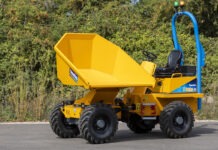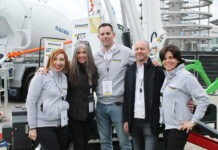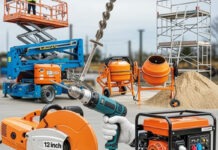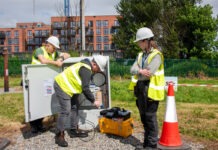Hyundai Construction Equipment has unveiled a completely new line of A-Series wheeled excavators, powered by EU Stage V diesel engines. The four machines, with operating weights of 14-23 tonnes, feature low emission Cummins diesel engines with a combined after-treatment system and no requirement for EGR, offering customers increased productivity, with lower emissions.
Features include: Cummins B4.5 and B6.7 Stage V compliant engines with no Exhaust Gas Recirculation (EGR) or requirement for manual Diesel Particulate Filter (DPF) regeneration. Load sensing hydraulic systems with load independent flow sharing for increased controllability. Improved operator comfort with adjustable steering column, optional joystick steering and Ride Control. Increased safety, with direction control and ram lock on joystick, optional auto-digging brake, LED working lights and second monitor for optional radar system
A machine for every application The revised line-up starts with the HW140A, weighing in at 14,900kg with a monoboom and 15,860kg with a two-piece main boom. This machine shares much of its undercarriage and upperstructure with the HW160A, with weights of 17,580kg/18,390kg. A compact radius HW170ACR is offered exclusively with a two-piece boom, at 18,810kg and the range is completed with the HW210A, at 22,270/23,665kg. Stage V low emission engines The HW140A, HW160A and HW170ACR are powered by a 4.5-litre Cummins B4.5 diesel engine, replacing the larger 6.7-litre engine in the previous generation of machines. Using a wastegate turbocharger, this compact engine has a Flex-Module two-can exhaust system, comprising a Diesel Oxidation Catalyst (DOC), Diesel Particulate Filter (DPF) and Selective Catalytic Reduction (SCR). There is no requirement for Exhaust Gas Recirculation (EGR), reducing service cost for customers, while the smaller engine is more fuel efficient than its predecessor.
Despite the reduction in engine capacity, the new machines benefit from an increased output, with the HW140A, HW160A and HW170ACR now all delivering 129kW (173hp), up from 117kW (156hp) on the previous generation HW140. This drives the machine through a Rexroth load sensing hydraulic system, with load independent flow control for consistent machine operating speed and improved controllability for the operator. The three machines feature a redesigned stacked cooling module, making it easier to keep clean. A hydraulically-driven reversible cooling fan is now standard, reducing any risk of overheating and minimising downtime for cleaning and maintenance. The larger HW210A retains a 6.7-litre engine, however it moves to the latest Cummins B6.7 model. With a variable geometry turbocharger, the B6.7 has a single module after-treatment system, with the DOC, DPF and SCR located in a single exhaust can. Again, there is no requirement for EGR on this engine and no need for manual DPF regeneration, cutting cost and downtime for customers.
As with the smaller engine, there is an increase in output, with the new Cummins unit delivering maximum power of 145kW (195hp). The 21-tonne machine has two Kawasaki hydraulic pumps with Electronic Pump Flow Control (EPFC), which has proven highly productive on Hyundai’s crawler HX210A and HX220AL. The machine benefits from a reduced minimum flow rate, improving fuel consumption by up to 8-11% depending on operation. Automatic idle is standard, further reducing fuel consumption, engine noise and exhaust emissions.
Robust construction
The HW140A and HW160A excavators’ swing centre and lower frame has been moved forwards by 100mm, boosting machine stability. In addition, the right-hand side of the upperstructure comes forward 150mm, to provide additional space for the fuel tank. The left-hand side moves forward by 230mm to improve visibility from the cab and to make additional space for the engine bay. The rear swing radius on the standard counterweight HW140A and HW160A also moves forwards by 200mm, to cut the rear overhang and make the machines more manoeuvrable on confined sites, while increasing lifting capacity.








